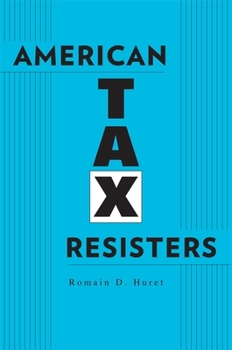American Tax Resisters
Select Format
Select Condition 
Book Overview
"The American taxpayer"--angered by government waste and satisfied only with spending cuts--has preoccupied elected officials and political commentators since the Reagan Revolution. But resistance to progressive taxation has older, deeper roots. American Tax Resisters presents the full history of the American anti-tax movement that has defended the pursuit of limited taxes on wealth and battled efforts to secure social justice through income redistribution for the past 150 years.
From the Tea Party to the Koch brothers, the major players in today's anti-tax crusade emerge in Romain Huret's account as the heirs of a formidable--and far from ephemeral--political movement. Diverse coalitions of Americans have rallied around the flag of tax opposition since the Civil War, their grievances fueled by a determination to defend private life against government intrusion and a steadfast belief in the economic benefits and just rewards of untaxed income. Local tax resisters were actively mobilized by business and corporate interests throughout the early twentieth century, undeterred by such setbacks as the Sixteenth Amendment establishing a federal income tax. Zealously petitioning Congress and chipping at the edges of progressive tax policies, they bequeathed hard-won experience to younger generations of conservatives in their pursuit of laissez-faire capitalism. Capturing the decisive moments in U.S. history when tax resisters convinced a majority of Americans to join their crusade, Romain Huret explains how a once marginal ideology became mainstream, elevating economic success and individual entrepreneurialism over social sacrifice and solidarity.Format:Hardcover
Language:English
ISBN:0674281373
ISBN13:9780674281370
Release Date:April 2014
Publisher:Harvard University Press
Length:384 Pages
Weight:0.95 lbs.
Dimensions:1.2" x 5.6" x 8.7"
Related Subjects
Business Business & Investing Economics History Political Science Politics & Social SciencesCustomer Reviews
0 rating





